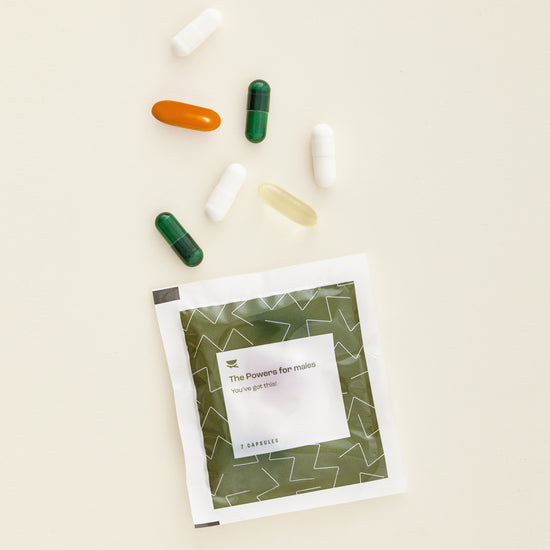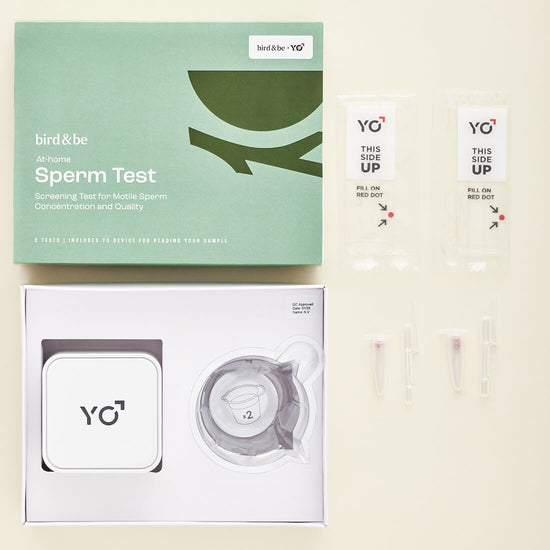Semen vs sperm: What’s the difference?
A lot of people use the terms interchangeably, but there’s a difference. Sperm refers to the male sex cell itself (AKA the gamete) while semen is the combo of sperm and fluid from the prostate and seminal glands. If you think of sperm as the tadpole-like “swimmers,” semen is the current that keeps them moving along. And if you’re wondering, yes, it’s possible to have semen without sperm. It’s called “azoospermia” and is estimated to affect about one percent of men. It’s not something the plan eye can detect, but you can take an at-home sperm test to easily check.How does sperm health affect fertility?
When it comes to conceiving, the sperm plays just as crucial of a role as the egg does. So, you’ll want both to be in tip-top shape. But because sperm are smaller than eggs, they can also be more vulnerable to nutritional deficiencies, toxins, smoking and alcohol—all of which can take a toll on sperm health. In fact, studies have found that “male factor” (basically, issues with the sperm) plays a role in 35 to 50 percent of all infertility cases.Is sperm health affected by age?
Though the testes never stop producing sperm, the quality of that sperm does seem to decrease with age. Studies have looked at different sperm parameters (more on those in a second) and found that most are affected negatively after 30, with the highest anomalies occurring after 50. Increased paternal age is also associated with decreased fertility success and increased miscarriages, and studies have linked it to autism, mental health disorders and some genetic disorders such as Angelman syndrome.What sperm health tests are available?
When it comes to fertile sperm, there are several measures that a doctor will analyze from a semen analysis:- Semen volume: How much semen is there?
- Sperm count: How many sperm are there?
- Sperm motility: How well do they move?
- Sperm morphology: Are they shaped properly?
- Semen pH: Is the balance between acidity and basicity optimal?
- Sperm DNA fragmentation: Is there any damage to the genetic material?
Some experts advocate for earlier screening tests, because no or low sperm values make conception very unlikely. Risk factors that you’d want to see your doctor about include a history of undescended testes, signs of low testosterone (such as low libido or erectile dysfunction), major testicle injury or injection, or a strong family history of male factor infertility. It’s also a good idea to talk to your doctor if you experience erectile dysfunction, which the stress of trying to conceive can exacerbate.
Can sperm be tested at home?
While a full workup of all sperm parameters needs lab testing, you can check your sperm motile concentration without heading to the doctor's office. Our non-invasive At-Home Sperm Test only takes 20 minutes and a smart phone to measure if you have enough swimmers that can move effectively—which is key for making their way to the egg for fertilization. It offers an early and easy way to get insights into your fertility, so that if needed, you can start taking antioxidants (try the doctor-approved The Power Prenatal for males), change lifestyle habits and/or see an expert sooner.How to improve sperm health?
To optimize sperm for fertility, you’ll want to focus on positive lifestyle shifts:- Cut smoking and excessive drinking
- Avoid overheating the testes
- Keep hydrated
- Eat a healthy diet
- Take daily sperm-health supplements
- Aim for a healthy weight
- Control stress
- Get enough sleep
- Adopt a strength-training routine
- Control diabetes
- Ejaculate regularly
It takes about 100 days for sperm to mature and they respond to the environment they’re developed in, so healthy changes can pay off in three months.
For more on sperm health, read about how to increase sperm motility and learn about PFAs and how they impact male fertility.







